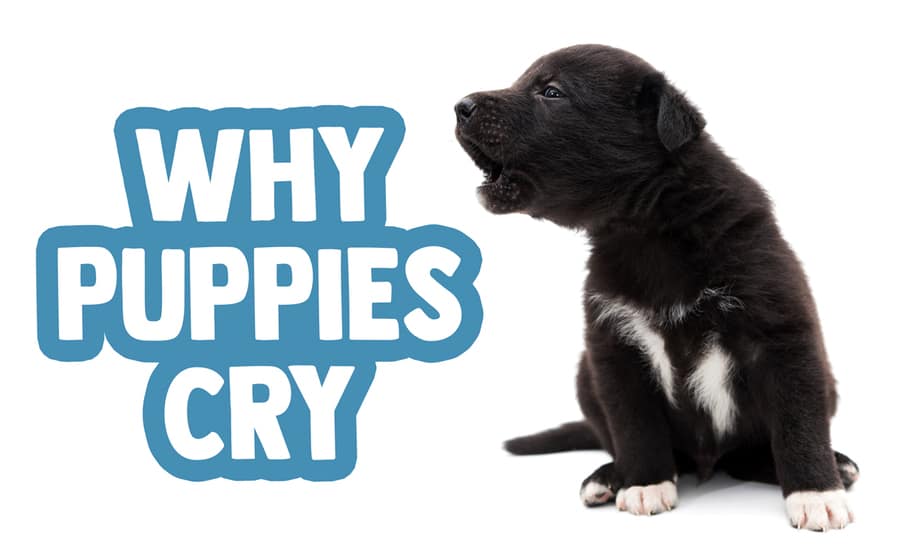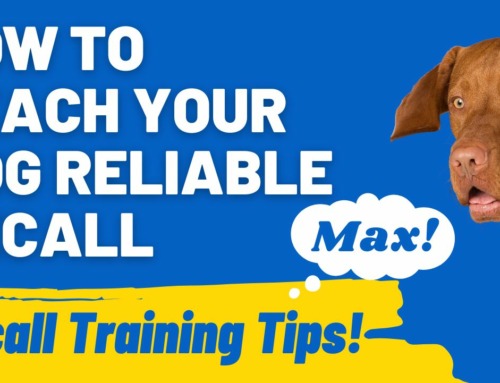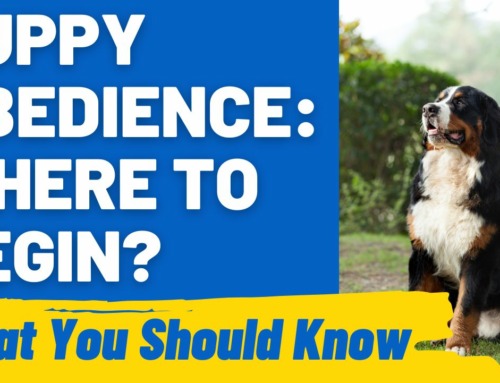It’s common for puppies to cry or whine when they are young for a variety of reasons. And despite the fact they are incredibly cute, puppy crying can become tiresome very quickly.
In this article, we explore the top reasons why your puppy is crying, as well as help you to determine which reason is the cause of crying for your puppy.
It’s important to always try and find the underlying reason why your puppy is crying, rather than just punishing them for the crying itself (such as yelling). Crying and whining is your puppy’s way of communicating with you!
Instead, you should always try and solve the reason your puppy is crying. Puppies are not purposefully crying to make your life difficult, rather, they are upset about something and need your help.
Let’s look at some of the reasons why they might cry and whine.
Puppy is crying because they’re teething
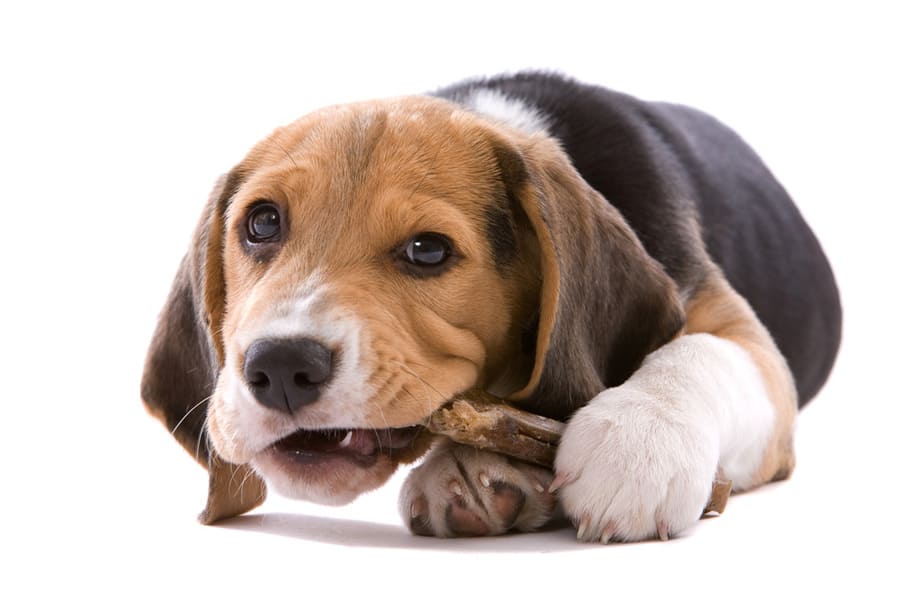
During teething a puppy may cry due to the pain they are experiencing. All puppies begin teething by three to four months of age, usually having all their adult teeth by six months of age. During this time, their mouth can be incredibly sore and uncomfortable.
If your puppy seems restless or is crying while they are chewing on something, they very likely may be crying because they are teething.
While teething may not be the entire reason why your puppy is crying, having a sore mouth often causes your puppy to be less tolerant than they would be otherwise.
You can compare this to days when you might have a headache, and you may become more easily frustrated. Plus, your puppy is just an infant at this point!
It’s important to note that there are no safe over-the-counter pain meds for dogs. Please do not give your puppy any medications for the pain and discomfort of teething that you have not gotten under the guidance of your puppy’s veterinarian.
Instead, providing your puppy with soothing chews is a great way to help them when they are crying because they are teething.
Veterinarian Comment
Toy selection should be done very cautiously. Ask your veterinarian for recommendations. Puppy teeth are not as strong as adult teeth and may be more prone to fractures. A fractured tooth can be incredibly painful and a source of infection. A rule of thumb I advise is that if you cannot indent the toy with your thumbnail, it is probably too hard for your puppy to chew on. I tend to recommend Kong toys for puppies. Ensure that your puppy is always supervised when having access to toys.
Dr Marti Dudley
There are a variety of chews, from hard Benebones and antlers to softer, rubber toys. You will likely have to experiment with a variety to see what your puppy likes best, and this may change as they grow, too.
It can be especially helpful if you can get your puppy to chew on something cold or frozen, as it can soothe their gums.
There are toys specifically made to be soaked in water and frozen for teething puppies. You can also give your puppy a Kong that has been stuffed with food and frozen.
Not only will it help their teeth, but it’s a great enrichment activity to keep them busy, too!
Even frozen carrots can be a helpful option to soothe your puppy’s teeth.
Here are three good options for teething toys for puppies by Nylabone, all under $10.
Nylabone Teething Pacifier Puppy Chew Toy
Nylabone Teething Rings Puppy Chew Toy
Nylabone Chill & Chew Freezer Chicken Flavored Dog Chew Toy
Chew toys don’t always soothe the mouth of a teething puppy, but teething is temporary and they are a great option to try as you navigate this time with your crying puppy.
If you have a poodle, you may wish to read our post Poodle Puppy Teething Stages: Timeline and Guide.
Puppy is crying because they’re hungry
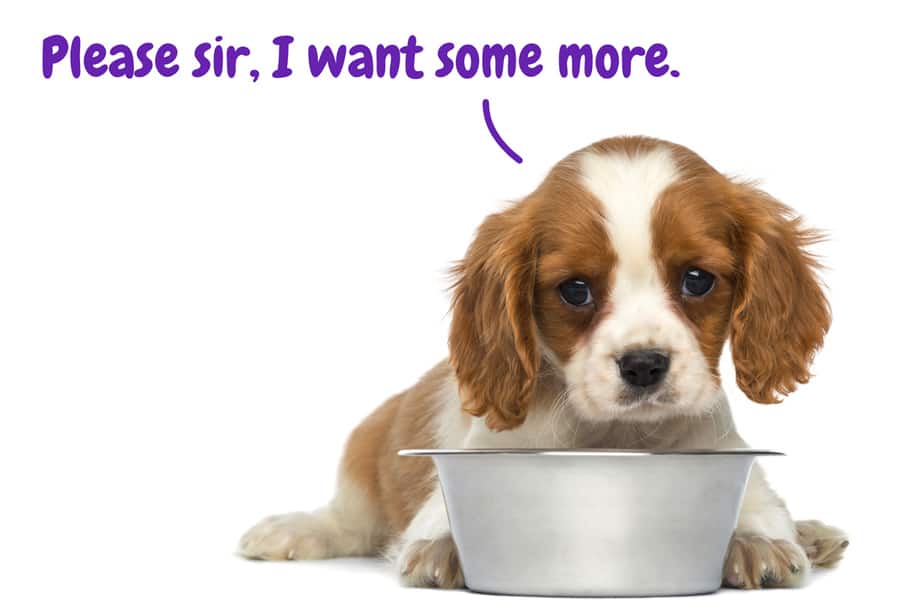
Puppies need to eat more often than adult dogs, especially if they are a small breed. As they adjust to scheduled meals, they may become frustrated and hungry more often than an older puppy would, causing them cry. A young puppy should be fed 3 to 4 times a day.
If it’s been a few hours since your puppy has eaten, they may be crying because they are hungry.
It’s best not to get in a habit of feeding your puppy when they cry for food, or it can become a habit for their adult life, too.
However, you don’t want to just ignore a hungry puppy! Instead, try and do something else with your puppy to distract them for a moment – play with a toy, go outside, etc. – and then offer a small amount of food.
If your puppy seems to be crying for food regularly, you should consider how much and how often you are feeding your puppy.
Some young puppies may benefit from splitting their meals into 3-4 meals a day, instead of just twice. As your puppy grows, they will also need more food.
You should feed your puppy based off of their needs for growth and their body condition. You want to be able to feel their ribs, but not see them protruding, in most breeds.
Your puppy’s veterinarian can help you decide if your puppy is a healthy weight or if they need more food. It’s important not to overfeed your puppy, though, because it can be unhealthy and shorten their lifespan.
Some puppies can benefit from fillers that don’t have a lot of extra calories mixed in their food – such as cooked green beans – to make them feel more full.
There’s also a rare genetic disorder that affects some dogs, such as Labrador Retrievers, that makes them unable to tell when their stomach is full.
Your veterinarian can advise you more on this if you have a Labrador Retriever and think your puppy may be affected.
Veterinarian Comment
Around 25% of Labrador retrievers have a mutation in the POMC gene. This gene is useful as it helps to regulate weight and food motivation. Labradors that have a mutated POMC gene are more prone to obesity as they have a higher level of food motivation. A New York Times article explains this gene in further detail and can be found here.
Dr Marti Dudley
Puppy is crying because they have separation anxiety
Separation anxiety is very common in puppies and the most common symptom is crying. However, in order for your puppy to qualify for separation anxiety, they need to be crying when they are left alone. So if you puppy cries when they are alone, then be sure to read our complete guide on separation anxiety here.
Puppy is crying because they miss their mom
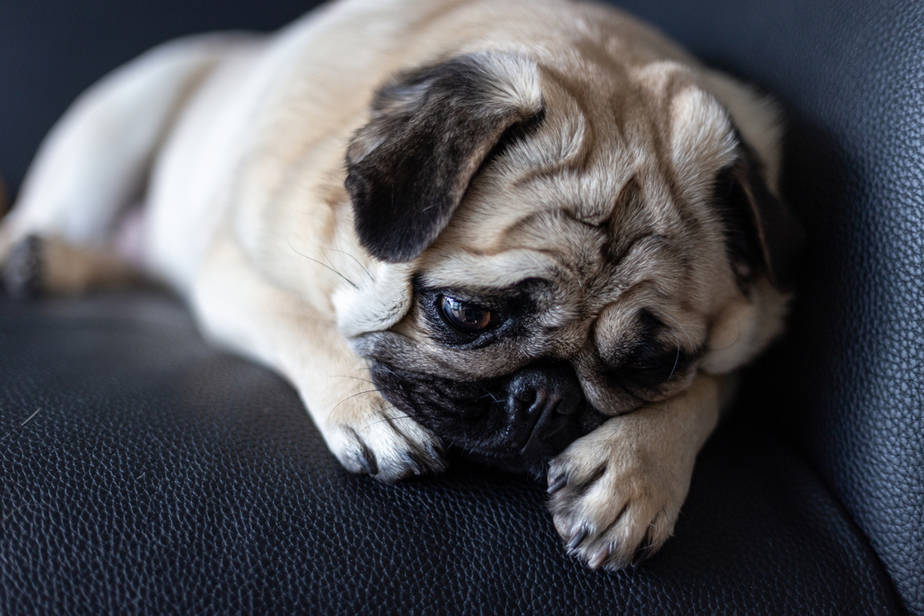
When your puppy first leaves their litter, they are likely going to be missing their mom and littermates a lot at first, especially when they get ready to nap. If they are left alone, your puppy’s crying may be due to them being lonely.
You can help ease this transition for your puppy by keeping them close to you at first. Instead of putting your puppy in a pen in another room for a nap, try keeping them in the same room so they feel more comfortable.
If you think your puppy is crying because they want attention, be sure to read our post on giving puppies attention and how much is required.
You should also make sure your puppy has something to snuggle with – a stuffed toy, a blanket, or a pillow, for example.
There are even stuffed animals designed for puppies that contain a heartbeat sound and have warmth, to help them feel more at home.
This is the heartbeat toy mentioned, and is excellent for separation anxiety:
In the early stages it’s also important that your puppy isn’t left alone for any extended periods of time. Be sure to read our post on how many hours you can leave your puppy alone at home.
One thing that breeders can do to help puppies transition to their new homes is to start giving their puppies appropriate alone time before they go home.
By crating the puppies individually for naps, next to their siblings, they can learn more easily to be comfortable alone in their new home.
If you are a breeder, this is one easy way to help your puppies fit into their new home as quickly as possible.
If you are an owner, this is one thing you can ask breeders if they do with their puppies, prior to choosing a breeder and bringing your puppy home.
My two youngest dogs, Hobbes and Windi, came from a breeder that started crate training and potty training the puppies several weeks before they went home. It truly helped to make the transition smooth, with minimal accidents and crying!
Puppy is crying at night
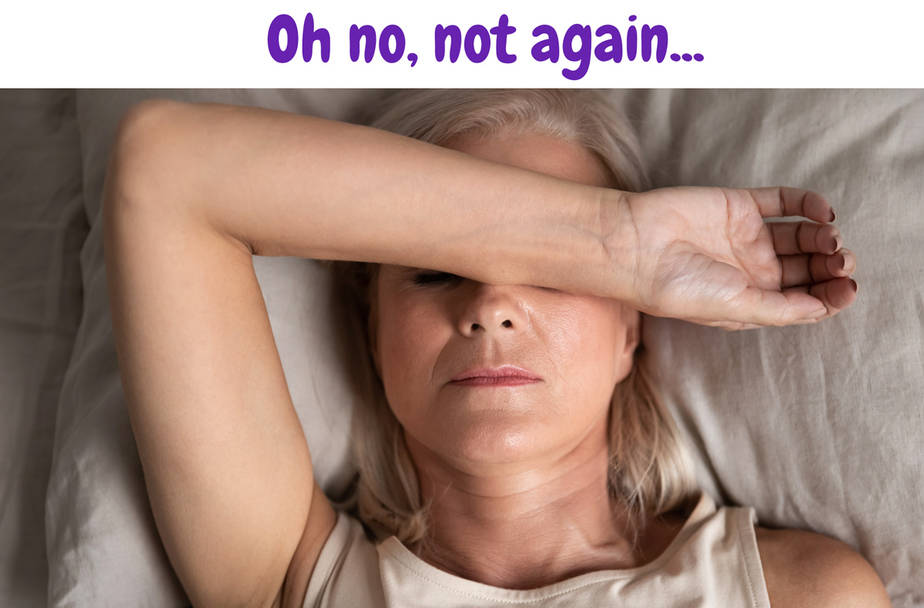
A puppy that is crying at night is likely crying because they are lonely, bored, or need to use the bathroom – or a combination of the three. You may have to try solutions for each until you get to know your puppy better and understand why they are crying.
We’ve gone deep on this topic to solve night crying once and for all in our post: Puppy is Crying at Night: Why and what to do.
It’s not at all uncommon for there to be a variety of sleepless nights when you first get a puppy – or at least nights where you get less sleep than you would without a puppy.
If your puppy starts crying immediately when you put them in a kennel or pen at bedtime, they are probably just lonely and not used to being separated from their litter.
You should be spending time every day getting your puppy used to settling alone, by trying some of the options mentioned above for lonely puppies, and giving your puppy a Kong or another toy to chew on and keep themselves occupied when alone.
It can also be helpful to put your puppy’s kennel or pen next to your bed. Many puppies will settle down and feel more comfortable if they can reach your hand and sense your presence.
If you think your puppy is crying because they are bored, then you should spend more time giving your puppy something to do during the day.
Puppies need a lot of sleep – up to 22 hours a day – but they also need to have proper outlets for their energy when they are awake!
Considering your puppy’s breed is important when determining how much exercise they need. All dogs need both mental and physical exercise, but breeds that were bred for jobs other than companionship – including gun dogs, herding dogs, and working dogs – often need much more physical and mental exercise than others.
Finally, your puppy may be crying because they need to use the bathroom. Puppies do not have the ability to hold their bladder as long as adult dogs.
The average puppy can hold their bladder for the amount of hours equal to their age in months, plus one. For example, a 3 month old puppy can often only hold their bladder for 4 hours.
If your puppy starts crying in the middle of the night, there’s a very good chance that your puppy needs a bathroom break.
In order to wean your puppy off of bathroom breaks in the middle of the night, and ensure they don’t cry to wake you up out of boredom, it’s important that bathroom breaks are just that.
Take your puppy out on a leash, rather than letting them explore the yard or run around. Praise and reward them for a job well done if they use the bathroom, and then it’s back to the kennel or pen for a nap.
Why is my puppy crying for no reason?
In short, your puppy will never cry for truly no reason. It might seem like your puppy is crying for no reason, and your attempts to soothe your puppy may not seem to help at first, but there is always an underlying reason for your puppy’s cries.
We’ve covered many common reasons that puppies may cry already in this article, from loneliness to hunger to boredom.
One of the other common reasons that puppies cry, though, is that they are tired.
Puppies often need to sleep 20-22 hours a day!
When your puppy is crying for no apparent reason, and you’ve tried soothing them in all the other ways we’ve mentioned earlier in this article, your best bet is to try and set your puppy up for a nap.
Puppies can often be like an overtired toddler, running around and crying and protesting a nap. They seemingly find all sorts of trouble to get into and nothing seems to help!
So, when all else fails, it’s often safe to assume that your puppy needs a nap.
It’s best to set your puppy up for a nap in a quiet place, and it never hurts to give them a Kong or something to occupy them and soothe them.
As you get to know your puppy, you’ll get better at learning their habits, which cry means what, and how to determine why your puppy is crying.

